| « Short Hops: Obama & Derrick & Joakim & Chauncey & Kobe | Chris Horner Speaks; CX Action » |
White Sox Mon Aug 09 2010
MLB Network White Sox Reality Show - Episodes 4-6
 The Minnesota Twins are on the horizon and the White Sox are nursing their wounds after dropping three of four in Baltimore, a fate sealed when the Orioles won Monday night for the sixth time in seven games under Buck Showalter, walking off with a 3-2 win when Brian Roberts homered off J.J. Putz in the 10th inning.
The Minnesota Twins are on the horizon and the White Sox are nursing their wounds after dropping three of four in Baltimore, a fate sealed when the Orioles won Monday night for the sixth time in seven games under Buck Showalter, walking off with a 3-2 win when Brian Roberts homered off J.J. Putz in the 10th inning.
But before the AL Central co-leaders -- both with 63-49 records -- meet Tuesday for the first of six games in 10 days, let's finish off the back half of the everyone's favorite White Sox quasi-reality show, the six-part MLB Network miniseries "The Club."
You'll recall that recapping the first three episodes in detail nearly sucked the life force bodily from me, so let's just hit the highlights this time. There actually were a few.
1. Trading deadline intrigue
The deadline having passed already, there was no reason to censor the specifics of the deliberations among Kenny Williams and his front office lieutenants that produced Edwin Jackson for Daniel Hudson. For that, we thank you.
We did learn a few things:
A. Easily the most newsworthy tidbit of the miniseries: It looks for all the world that the reason Jackson didn't go on to Washington for Adam Dunn is Kenny simply preferred Jackson to Dunn.
Kenny didn't say this in an interview with producers after the fact (which might have meant he was saving face after failing to get Dunn). He said it in an exchange with assistant general manager Rick Hahn in the "war room" on Saturday as the deadline approached:
Kenny: I'm contemplating doing the same thing to Washington.
Hahn: What would the offer be?
Kenny: I don't know yet.
Hahn: Has there been a Jackson-for-Dunn offer rejected by them yet, even?
Kenny: No. It hasn't been offered yet.
Hahn: Right. That's what I'm saying. Could you start with that?
Kenny: I'd rather keep Jackson.
B. Sox fans, I think, can rest easy that Kenny and his front office assistants considered all the angles before acquiring Jackson. His status as a "proven veteran" didn't blind them to the fact that, as Kenny noted, Jackson was carrying a 5.00 ERA in the National League and might only give them five or six good innings each night. And they debated whether they'd rather have Jackson -- who is at best a No. 3 starter, special assistant Bill Scherrer said -- or the talented rookie Hudson, brimming with unfulfilled potential.
In the end, from what we saw, the Sox prioritized a fifth starter (or fourth, depending on Freddy Garcia's endurance) over a left-handed bat largely because Jake Peavy's season-ending injury had them mulling the fragility of pitching and the ol' "good pitching beats good hitting" maxim.
Dave Yoakum, another special assistant to the GM, worried about Hudson in the crucible of a September pennant race. Assistant director of baseball operations Daniel Zien wondered if a left-handed hitter would even be all that useful in the playoffs against southpaws such as CC Sabathia and Andy Pettitte of the Yankees, Cliff Lee and C.J. Wilson of the Rangers and David Price of the Rays.
(I, of course, am on record questioning why the left-handedness of this potential new hitter was such a big deal in the first place.)
Kenny even wondered at one point if this should be the rare season the Sox don't trade for help at the deadline. He kept looking at the established players on the market and decided "the names look better than the performances."
C. Kenny laughed when Ken Rosenthal reported on TV that the Sox were asking the Dodgers about Manny Ramirez. (An apparently accurate report? We didn't see any footage of them discussing Manny.) "All right," he said, "everybody put your phones in the middle of the table." And a moment later: "How is he getting this shit?"
D. Explaining how hard it can be to tell a favored player he's been traded, Kenny told the story of trading Aaron Rowand after the 2005 season. He called Rowand and caught him in the car with his wife. She yelped in alarm and dismay when Kenny delivered the bad news. "It went through my heart," Kenny recalled.
2. Fun with screen caps
Excuse the low-grade visuals, but I had to share these unusual sights.
Adventures in dress attire: Omar Vizquel and Freddy Garcia
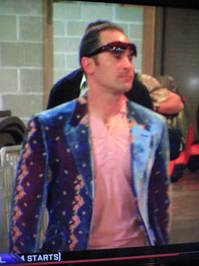
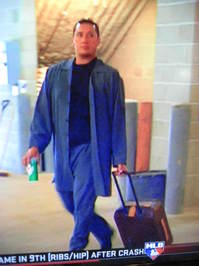
Adventures in family photography: Ozzie & the Guillens
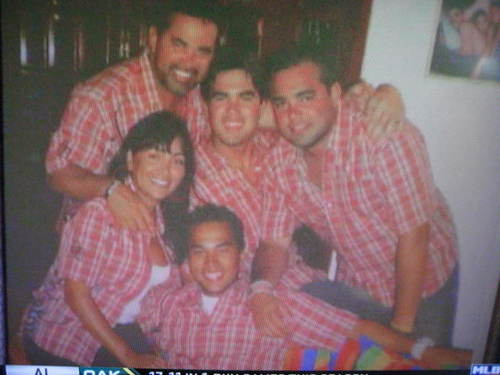
Don't miss last year's photo on the wall behind them:
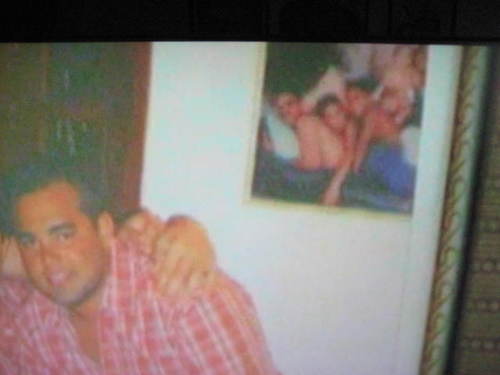
Congratulations all around on some lovely photos.
3. When Ozzie met Kenny
Jerry Reinsdorf recalled how he pushed Kenny to interview Ozzie when the Sox were looking for a new manager after the 2003 season.
Kenny invited Ozzie in, and purposely goaded him by questioning whether he was good enough to get the job. Ozzie popped off, of course, wondering why they brought him in if they didn't think he could do the job. It was the vigorous response Kenny was looking for -- and it's why he doesn't bat an eye when Ozzie goes off these days.
"I hired a man that during his interview argued with me," Kenny pointed out. "Do you think now, seven years later, playoff appearances, a World Series championship -- do you think that I'm going to let a little bit of friction here and there ruin what has been a successful endeavor here? No."
This is mostly an excuse to post this screen cap of 2003 Kenny with a grand mustache:
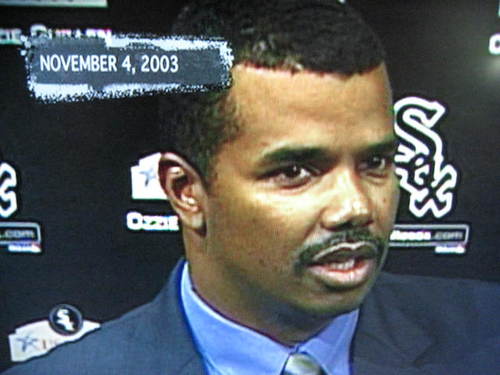
Somebody needs to get Kenny to bring that back.
4. Ozzie isn't actually that funny
Don Cooper, the pitching coach, is far more gregarious and outgoing in a jovial, inclusive way. Ozzie's brand of humor is more like the Big Man on Campus who gets laughs just because he's the center of attention. He's "funny" not because he's clever, but because he's somewhat outlandish and brash and just says and does whatever he wants.
And of course, the threshold for athlete humor is almost unimaginably low. This is a world of emotionally arrested adolescents where Shaq and LeBron are typically considered comic geniuses just for acting goofy.
5. Nuts and Bolts
There wasn't nearly as much detail about How Things Work as I'd have liked -- strength and conditioning coach Allen Thomas was introduced and discarded in about 30 seconds -- but clubhouse manager Vince Fresso did have a few bon mots:
- It's usually easier to pack and ship pitchers' gear -- they're more "low maintenance" -- "but they're more practical jokers, because the starters have some time in between starts."
- "Remembering the superstition of each
gameguy is a challenge, too. Certain guys don't like to have new pants. Certain guys don't like to have new hats."
6. Better Next Time
MLB Productions really needs to put some more time and money into these seasons of "The Club" or not do them at all. As it stands, this is mostly stuff the modern sports fan has seen a million times. Merely showing up clips of batting practice and postgame interviews and guys standing around the clubhouse isn't especially interesting to the national fan or the White Sox diehard.
Never mind the awkwardness of having the story end in the middle of the season. Not that it's necessarily better to run this after the season ends, but we're leaving them just as the epic comeback story is getting good. For all the drama of the decision to go all in with Edwin Jackson, the story has no ending. We don't know yet if it was the right decision, and the show fizzles a bit dramatically for that reason.








